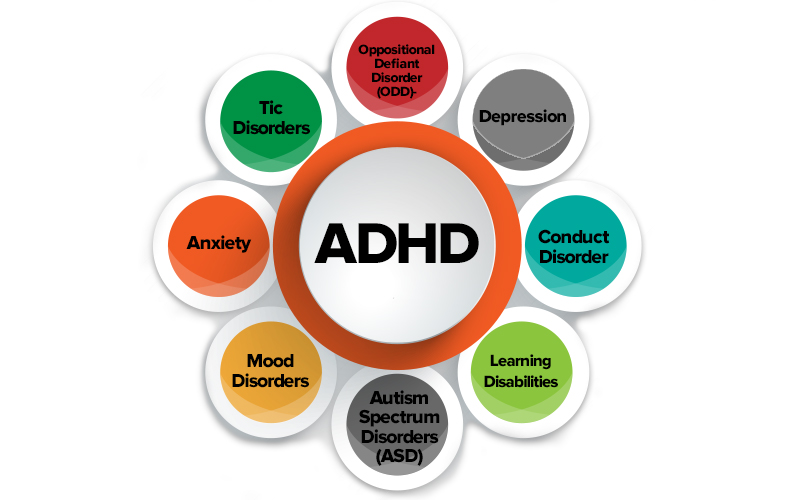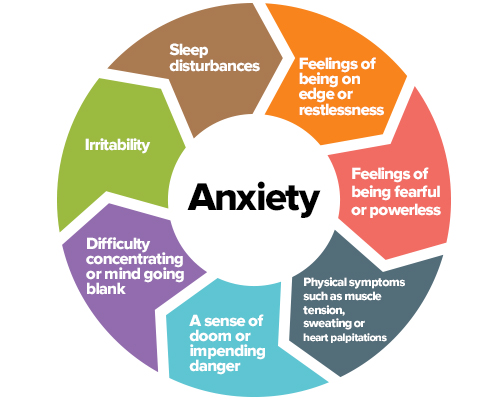Attention-Deficit/Hyperactivity Disorder
Conditions Associated with ADHD

Approximately 2/3 of children with ADHD will be diagnosed with at least one other mental health or learning disorder during their lifetime. These disorders include the following:
Learning disabilities include a large number of disorders that are associated with problems in specific thought processes that cause difficulty in learning information or developing new skills. People with learning disabilities often are of normal intelligence, but have difficulty with specific parts of learning. More than ¼ of children with ADHD also have a learning disability, such as dyslexia (difficulties with reading, spelling, etc.). Here are some resources about learning disabilities:
- understood.org Excellent source of information on both ADHD and learning disabilities
- Learning Disabilities Association of America. Handbooks, guides, and recommendations for children and adults with learning disabilities, includes information about ADHD
- LDOnline. Focused on education of children with learning disabilities, includes information about ADHD
- International Dyslexia Association. An association that provides support around dyslexia and other related reading differences with an informative website, conference and other resources
Children with ODD tend to act defiant towards authority figures such as parents and teachers. This can cause significant difficulties at both home and school. Up to ½ of children with ADHD will also have ODD. Here are some resources:
ODD Resource Center by American Academy of Child & Adolescent Psychiatry
The ADHD-ODD Link in Children
Disruptive Behaviors Page from CHADD Website
Excellent talk about the relationship between ADHD and Oppositional Defiant Disorder (Video)
Very brief Explanation of crossover between these 2 disorders (Video)
Conduct disorder is a repetitive and persistent pattern of behavior in children and adolescents in which the rights of others or basic social rules are violated. The child or adolescent usually exhibits these behavior patterns in a variety of settings—at home, at school, and in social situations—and they cause significant impairment in his or her social, academic, and family functioning.
Understood.org information on the difference between ADHD and disruptive behavior disorders
American Academy of Child and Adolescent Psychiatry Conduct Disorder Resource Page
Child Mind Institute Conduct Disorder Basics
Short description of Conduct Disorder (Video)
Excellent Video discussing ODD, Conduct Disorder and several related disorders (Video)
People with ADHD have an increased rate of anxiety disorders. It is estimated the ½ of adults with ADHD also have anxiety. There are many different anxiety disorders, but they are all characterized by similar symptoms such as:

In addition to having these symptoms, there must also be impairment in day-to-day functioning. A person with an anxiety disorder often experiences a decreased quality of life and difficulty maintaining employment and relationships. In children, these symptoms can be very challenging to identify.
AnxietyBc.» Excellent information for both children and adults with anxiety.
Psych Central.» Excellent information for adults.
Signs Your Young Child Might Be Struggling With Anxiety
Childhood Anxiety (Video)
How to Help Your Child Manage Stress/Childhood Anxiety (Video)
The Truth About ADHD and Anxiety in Adults (Video)
Mood disorders including depression, bipolar disorder, and seasonal affective disorder have been shown to be more common in people of all ages with ADHD. It has been estimated that around ¼ of children with ADHD and close to ½ of adults with ADHD have co-occurring mood disorders. It is essential to watch for signs of these disorders and seek treatment as needed.
Mood Disorders and ADHD
Depression, Anxiety, and ADHD from Chesapeake ADHD Center
Pediatric Bipolar Disorder from CHADD
ADHD and Depression: What you need to know by Understood.org
It is estimated that about 1/10 children with ADHD also have a tic disorder. Tics are involuntary, repetitive movements (eye blinking, head jerking, or lip smacking) or sounds (sniffing, throat clearing, coughing) that are typically not rhythmic. There are several tic disorders, but the most recognized and severe disorder is Tourette Syndrome (TS). Tourette Syndrome includes a combination of both motor and vocal tics ongoing over time.
Tourette Syndrome Fact Sheet from National Institute for Neurological Disorders and Stroke
Tics and Tourette Syndrome from CHADD
Stimulant Treatment of Children with ADHD and Tics from Psychology Today
Tourette’s syndrome & tic disorders-definition, symptoms, diagnosis, and treatment (Video)
Excerpt from I Have Tourette’s But Tourette’s Doesn’t Have Me by HBO (Video)
Autism include a large range of disabilities that are characterized by difficulties with social skills, communication, repetitive behaviors, changes in routine, and the way the experience different senses. There are many symptoms commonly seen in ADHD that are also seen in autism. It has been estimated that approximately 1/3 of children diagnosed with ADHD also meet criteria for autism. In addition, having a diagnosis of ADHD has been shown to delay the diagnosis of ASD by up to 3 years. Due to this fact, it is important to think about autism in any child with ADHD.
Autism vs. ADHD: A Parent’s Guide to Tricky Diagnoses from ADDitude
ADHD Symptoms Can Delay Autism Diagnosis for Years from Autism Speaks
What is Autism? (Video)
What is an Autism? (Video)
Is it ADHD, Autism, or both? (Video)

